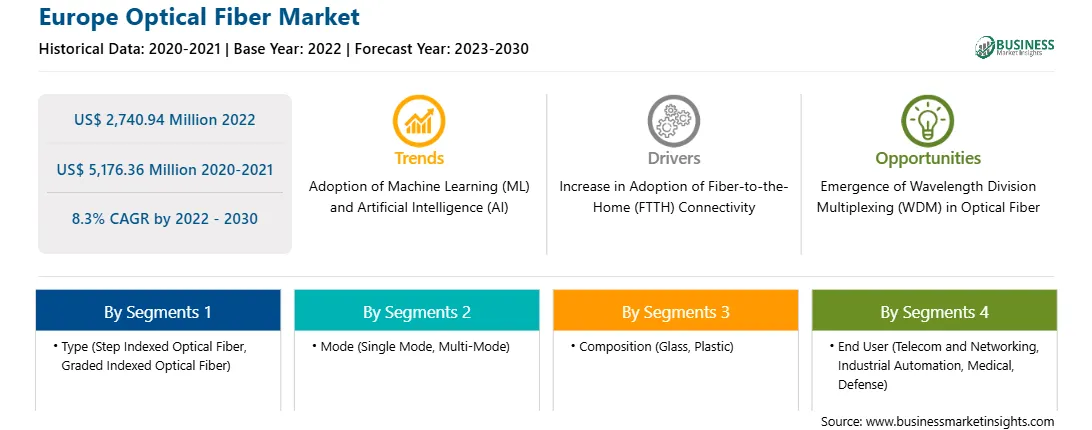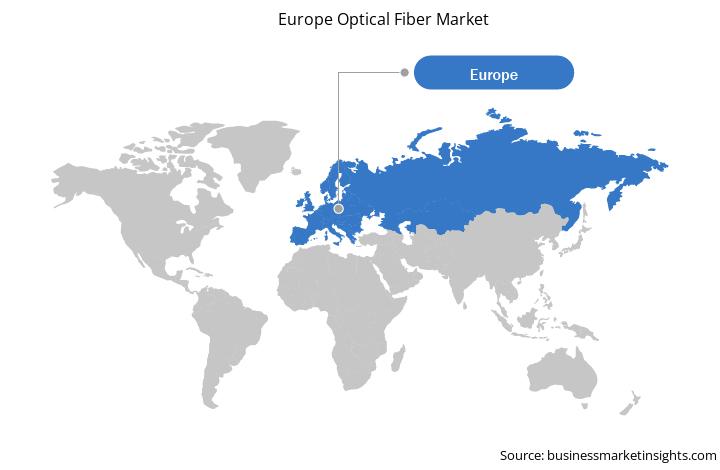The Europe optical fiber market was valued at US$ 2,740.94 million in 2022 and is expected to reach US$ 5,176.36 million by 2030; it is estimated to record a CAGR of 8.3% from 2022 to 2030.
Widespread Implementation of 5G Drives Europe Optical Fiber Market
5G is the fifth generation of telecommunication networks and is considered a breakthrough in communication technology. It offers several benefits, such as high bandwidth, enhanced mobile broadband, lower latency, and higher data rates. To support these capabilities, a robust and reliable infrastructure is required, and optical fiber is a key component of this infrastructure. Optical fiber is a thin, flexible, and transparent fiber made of silica or plastic that can transmit data using light signals. It provides high-speed and high-capacity data transmission, making it ideal for supporting the increased demands of 5G networks. Optical fiber offers several advantages over traditional copper cables, including higher bandwidth, longer transmission distances, and immunity to electromagnetic interference.
The implementation of 5G technology requires a significant expansion of the existing network infrastructure. This includes the deployment of small cells and macro cells to ensure seamless coverage and capacity. Small cells are low-power base stations that are deployed in densely populated areas, while macro cells are larger base stations that cover larger areas. Both small cells and macro cells require high-speed and reliable backhaul connections, which can be efficiently provided by optical fiber.
As optical fiber provides larger bandwidth for longer distances and at faster speeds, it is expected to play a crucial role in supporting the high number of connected devices in 5G networks. Also, as optical fiber provides wide-area coverage and supports the bandwidth requirements of 5G networks, its demand in the market is increasing. Moreover, Ericsson has projected that by the end of 2028, the number of 5G subscriptions is anticipated to surpass 4.6 billion, representing more than 50% of total mobile subscriptions. As a result, there is a growing need for substantial optical fiber deployments in backhaul networks worldwide.
Europe Optical Fiber Market Overview
The Europe optical fiber market is segmented into France, Germany, Russia, Italy, the UK, and the Rest of Europe. The optical fiber market in Europe is witnessing rapid growth due to several factors such as the commercialization of high-speed networks, the increasing number of small and medium-sized businesses, and the rising demand for bandwidth and reliability across various industries. The market expansion is further driven by a rise in internet penetration, a surge in data traffic, and a rise in the implementation of the Internet of Things (IoT). Additionally, the rising popularity of online streaming services, video conferencing, and other bandwidth-intensive applications fuels the demand for high-speed internet in Europe. This increased demand is overburdening the capacity of existing copper-based networks, as they are unable to keep up with the bandwidth requirements.
In contrast, optical fiber offers significantly higher bandwidth capacity, making it the preferred solution to meet the surging demand for high-speed internet in Europe. Governments of many countries across Europe are providing financial support to facilitate the deployment of fiber optic networks, thereby accelerating their adoption in the region. Notably, the Europe optical fiber market is specifically designed for outdoor use, considering the challenging environmental conditions often encountered in the region. These outdoor fiber optics are constructed with materials that are resistant to water, corrosion, and other environmental factors. In Europe, optical fiber manufacturing companies also adhere to high manufacturing standards due to the imposition of stringent regulations. These regulations necessitate compliance with requirements related to performance, safety, and environmental impact. For instance, The European Electronic Communications Code (EECC) is a directive in EU law that updated the regulatory framework for communications services. The European Parliament adopted the EECC on June 6, 2018, and ordered EU member states to transpose the EECC provisions into their national laws by December 21, 2020. The EECC aims to harmonize the rules for electronic communications networks and services, promote competition and innovation, ensure consumer protection and access, and foster the development of the digital single market.
Europe Optical Fiber Market Revenue and Forecast to 2030 (US$ Million)
Strategic insights for the Europe Optical Fiber provides data-driven analysis of the industry landscape, including current trends, key players, and regional nuances. These insights offer actionable recommendations, enabling readers to differentiate themselves from competitors by identifying untapped segments or developing unique value propositions. Leveraging data analytics, these insights help industry players anticipate the market shifts, whether investors, manufacturers, or other stakeholders. A future-oriented perspective is essential, helping stakeholders anticipate market shifts and position themselves for long-term success in this dynamic region. Ultimately, effective strategic insights empower readers to make informed decisions that drive profitability and achieve their business objectives within the market.

| Report Attribute | Details |
|---|---|
| Market size in 2022 | US$ 2,740.94 Million |
| Market Size by 2030 | US$ 5,176.36 Million |
| Global CAGR (2022 - 2030) | 8.3% |
| Historical Data | 2020-2021 |
| Forecast period | 2023-2030 |
| Segments Covered |
By Type
|
| Regions and Countries Covered | Europe
|
| Market leaders and key company profiles |
The geographic scope of the Europe Optical Fiber refers to the specific areas in which a business operates and competes. Understanding local distinctions, such as diverse consumer preferences (e.g., demand for specific plug types or battery backup durations), varying economic conditions, and regulatory environments, is crucial for tailoring strategies to specific markets. Businesses can expand their reach by identifying underserved areas or adapting their offerings to meet local demands. A clear market focus allows for more effective resource allocation, targeted marketing campaigns, and better positioning against local competitors, ultimately driving growth in those targeted areas.

1. Corning Inc
2. Prysmian Spa
3. Jiangsu Zhogtian Technology Co Ltd
4. Yangtze Optical Fiber and Cable Joint Stock Ltd
5. Fiberhome Telecommunication Technologies Co Ltd
6. CommScope Holding Co Inc
7. Nexans SA
8. Furukawa Electric Co Ltd
9. Sumitomo Electric Industries Ltd
10. Coherent Corp
The Europe Optical Fiber Market is valued at US$ 2,740.94 Million in 2022, it is projected to reach US$ 5,176.36 Million by 2030.
As per our report Europe Optical Fiber Market, the market size is valued at US$ 2,740.94 Million in 2022, projecting it to reach US$ 5,176.36 Million by 2030. This translates to a CAGR of approximately 8.3% during the forecast period.
The Europe Optical Fiber Market report typically cover these key segments-
The historic period, base year, and forecast period can vary slightly depending on the specific market research report. However, for the Europe Optical Fiber Market report:
The Europe Optical Fiber Market is populated by several key players, each contributing to its growth and innovation. Some of the major players include:
The Europe Optical Fiber Market report is valuable for diverse stakeholders, including:
Essentially, anyone involved in or considering involvement in the Europe Optical Fiber Market value chain can benefit from the information contained in a comprehensive market report.